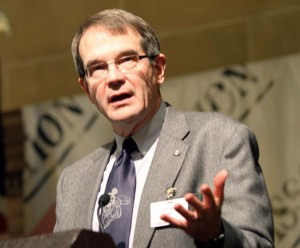Saying his union is in the midst of “reinventing” itself, United Auto Workers President Bob King strode into the lion’s den, this week, aiming to convince a gathering of Michigan’s most powerful business leaders that the labor movement is not just relevant but useful.
Collaboration, rather than confrontation, has been a key message for King, a one-time fire-breathing orator who has taken a much more laid-back and conciliatory approach since assuming the helm of one of the nation’s most powerful labor organizations last year.
It was a direction already set by his predecessor, Ron Gettelfinger, who agreed to a series of once-taboo concessions during 2007 contract talks with Detroit’s Big Three, and again during the deep recession that nearly crushed the domestic makers, forcing General Motors and Chrysler into bankruptcy.
“Our union has learned many lessons from this crisis,” King proclaimed, adding that, “We are in the process of reinvesting our union.”
Arguably, the UAW has no choice but to adapt. Its dues-paying membership sank to 376,612 at the end of 2010, barely a quarter of the 1979 peak, when membership reached 1.53 million.
With the union getting ready to return to the bargaining table with GM, Ford and Chrysler – and preparing an organization drive aimed at foreign-owned transplants – King has been spending much more time out in public in recent weeks. But he admitted the gathering on Michigan’s quaint Mackinac Island was a bit out of his normal realm of experience.
Walking into the big ballroom at the Grand Hotel he admitted feeling as if he had inadvertently wandered into a Republican convention. Certainly, many of the executives on hand at the Michigan Policy Conference are major supporters of the GOP.
But King suggested his audience think carefully about their political ties, pointing out that Republicans on Capitol Hill tried to prevent the GM and Chrysler bailouts, leaving the effort to save the makers to be championed by then-new President Barack Obama, a man often presented as being “anti-business.”
King also insisted that it took strong pressure from the UAW to convince Democrats, especially at the White House, to agree to back the makers as they emerged from Chapter 11 protection.
Indeed, during an appearance in Detroit, last week, current White House auto czar Ron Bloom acknowledged that even some of the president’s closest advisors initially opposed efforts to save Chrysler.
Recent events suggest that the bailouts worked, King noted. Chrysler just last week paid off its remaining $7.5 billion in federal loans, while GM last November sold off about half the stake in the company held by taxpayers. Both manufacturers have been posting strong profits – and have been hiring new union workers as they boost U.S. production.
A sizable share of those new workers will be brought in under a new two-tier structure approved by the union in 2007. They will be making roughly half what established line workers get – though the UAW may ask for an increase during the upcoming talks.
The union has taken other steps to help the Detroit makers, notably including the creation of the VEBAs, or Voluntary Employee Beneficiary Associations, that allowed Detroit makers to get strangling health care costs off their books.
By some estimates, UAW concessions have cut Big Three production costs by as much as $20 an hour, bringing them in line with leading Japanese transplants, such as Toyota and Honda.
“Too many people focus on the union of the 20th century. They need to be honest about how the union’s changed,” King insisted.
Walking into the lion’s den, King suggested business leaders might consider the advantages of unionizing, rather than continuing the seemingly popular strategy of union-bashing. But there appears to be another reason why the UAW boss is making such appearances lately.
King has acknowledged it is essential for the Autoworkers Union to crack the transplants. With rare exception, they remain unorganized and the few efforts to gain some traction at those plants eventually failed.
Under the new boss, the UAW has begun putting together a new organizing strategy and has warned that foreign makers who continue to resist could face a global campaign accusing them of human rights violations. But after warning it was ready to announce a target company – which many believe would be Toyota, which closed its only UAW-organized plant last year – the union has backed down. King will only say that talks are underway with several unnamed carmakers.
And perhaps that better fits the new “21st Century union” model that he is promoting, looking for ways to get management to deliver without sounding the war drums.

